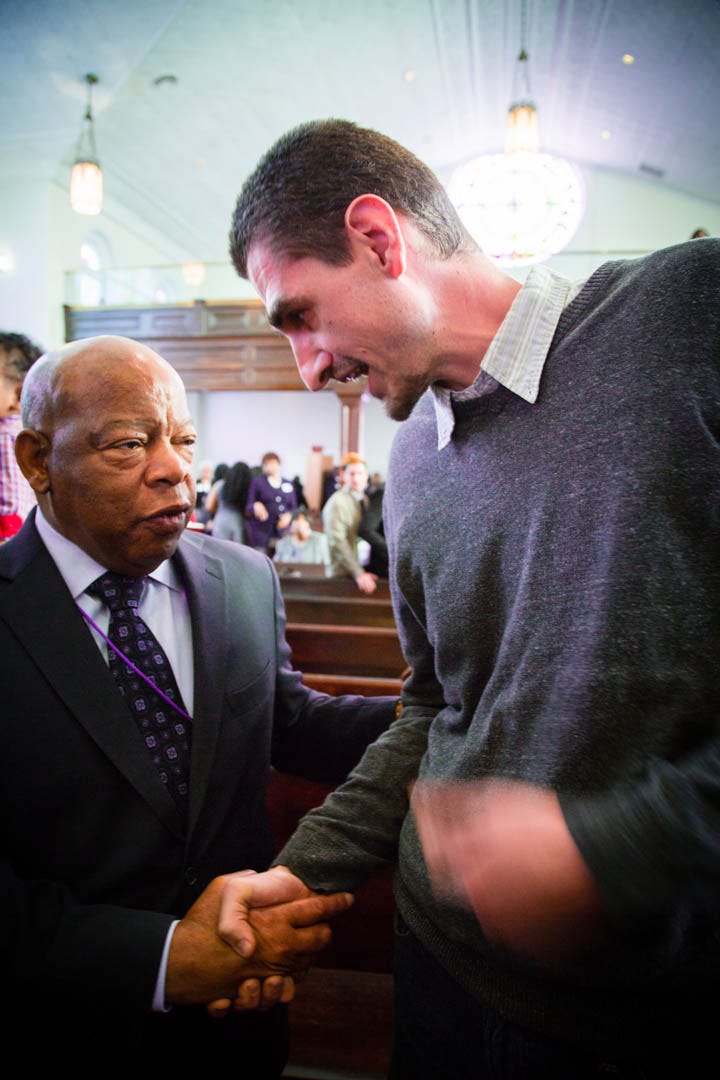What I Learned From John Lewis
When Things Look Bad, Lean In. How Moral Movements Overcome Evil.
Next Thursday, July 17, communities that are outraged by the Trump regime’s assault on government, democracy, and our most basic values will gather for Good Trouble Lives On rallies in more than a thousand US cities. We’ll gather to remember that the cruelty we witness on the news every day is not normal. We’ll rally to remind one another that we’re not alone.
And we’ll honor the life and witness of Congressman John Lewis, who died five years ago this summer. The national “Good Trouble Lives On” mobilization is on a Thursday next week because July 17, 2020 is the day when John Lewis transitioned from this earthly life to the communion of saints. It’s a call to remember his courage in the face of Jim Crow’s fascism and to embrace the moral wisdom he embodied as we face our own 21st century authoritarianism.
I’ve been thinking about John Lewis a lot this week because I’ve been checking in with friends across the South. For about a decade, I worked with elders of the Southern Freedom Movement to host “21st-Century Freedom Rides” that brought people who were working to build community and fight injustice in their communities through the South to learn from the generations who’d come before us how they practiced nonviolence, took on Jim Crow, built new organizations, and took care of one another in the face of brutal violence. I met John Lewis in the Brick-A-Day First Baptist Church of Montgomery, AL, where he’d attended nonviolence seminars as a teenager with Rev. Jim Lawson and Dr. Martin Luther King, Jr.
I learned from John Lewis and the many SNCC veterans who invited us into the beloved community of their movement family that the Southern Freedom Movement never turned away from America’s darkness. They rode the Freedom Rides all the way to Mississippi’s Parchman Prison because they knew that was the deepest, darkest hole in the South. And if they could shine the light of freedom there, they could expose the lie of the whole filthy, rotten system.
They didn’t try to avoid Bull Conner in Birmingham. They designed a campaign to confront his violence with moral courage - to expose the poison of white supremacy for all the world to see on their television screens.
Foot soldiers of the Southern Freedom Movement like John Lewis weren’t just courageous. They were strategic. They knew the moral force of truth to expose abuses of power. When violence and brutality are at their worst, that’s when you lean in, they taught us. Just when things seem worst, that’s when you’re on the verge of a breakthrough in a moral struggle.
I’ve been thinking about that lesson they drilled into me because I’ve spent much of this week talking with friends across the South - many of whom I got to know on those Freedom Rides - about why Moral Mondays are going South.
This coming Monday, July 14, Bishop
and a coalition of clergy, advocates, and directly impacted people will launch a bold new phase of the Moral Monday movement. We’ll hold demonstrations at congressional offices in 11 Southern states, condemning the Big Ugly Bill as the largest legislative transfer of wealth from the poor to the rich in U.S. history. We will bring the people who will be hurt first and worst to challenge their Senators and Representatives who voted to devastate their communities with massive cuts to social programs and an extreme investment in ICE raids and concentration camps.We’re doing it across the South because we know that John Lewis and so many who worked with him were right: poor and rejected people in the South have the political power to change the conversation about what is possible in America. If we change the South, we can change America. We have to do it by leaning into the moral wisdom that was entrusted to us by generations of moral fusion movements.
If you’d like to join a Moral Monday action in Alabama, Arkansas, Mississippi, Florida, Texas, Georgia, South Carolina, Tennessee, Louisiana, West Virginia, or North Carolina, register here to have your local details emailed to you over the weekend.
You can also watch a livestream of our flagship event in Memphis at 12 CT/1pm ET on Monday.
The power of the South’s moral movements is a collective wisdom that has been passed from one generation to the next. I’ll leave you with a touching moment that I will always remember when John Lewis came to my hometown of Durham, North Carolina, to present Bishop Barber with the Fellowship of Reconciliation’s Martin Luther King, Jr. Award. Good Trouble lives on, indeed.




I would like to honor also a years passing of the great Reverend James Lawson, who died one year ago on 9 July. I think he wasn’t as well known far and wide as perhaps some of the other greats like MLK and John Lewis, but he was a backbone and Prophetic within the civil rights movement helping to bring the concept of nonviolent resistance into that context.
My wife met Mr. Lewis the few summers before he died and she said there was a very special presence about him. He had the ability to be fully present with each person he met. His loss is greatly felt.